Transcription of Freedom of the Will
1 Freedom of the WillA Careful and Strict Inquiry into the Modern Prevailing Notions of that Freedom of the Willwhich is Supposed to be Essential to Moral Agency, Virtue and Vice, Reward and Punishment,Praise and BlameJonathan EdwardsCopyright Jonathan Bennett 2017. All rights reserved[Brackets]enclose editorial explanations. Small dots enclose material that has been added, but can be read asthough it were part of the original text. Occasional bullets, and also indenting of passages that are not quotations,are meant as aids to grasping the structure of a sentence or a thought. Every four-point ellipsis .. indicatesthe omission of a brief passage that seems to present more difficulty than it is worth. Larger omitted passagesare reported on between brackets, in normal-sized type. Edwards s discussions of and quotations from Biblicalpassages are omitted, as they add nothing to the book sphilosophicalvalue. Those omissions are signposted asthey launched: September 2006 Last amended: December 2007 Freedom of the WillJonathan EdwardsContentsPart I: Terms and Topics that will come up in the rest of the work1 Section 1: The nature of the will .
2 1 Section 2: Determination of the will ..2 Section 3: The meanings of necessary , impossible , unable etc., and of contingent .. 7 Section 4: The division of necessity and inability intonaturalandmoral..12 Section 5: The notions of liberty and moral agency .. 17 Part 2: The Freedom of will that the Arminians think is the essence of the liberty of moral agents: Does it exist?Could it exist? Is it even conceivable?19 Section 1: The Arminian notion of liberty of will as consisting in the will s self-determining power its obviousinconsistency ..19 Section 2: Two attempted escapes from the foregoing reasoning ..20 Section 3: Can volition occur without a cause? Cananyevent do so? ..22 Section 4: Can volition occur without a cause because the soul is active? ..26 Section 5: Even if the things said in these attempted escapes were true, they are quite irrelevant and can t help thecause of Arminian liberty; so that Arminian writers have to talk inconsistently.
3 28 Section 6: What determines the will in cases where the mind sees the options as perfectly indifferent? ..30 Section 7: The view that Freedom of the will consists in indifference ..33 Section 8: The view that Freedom of the will rules out every kind of necessity ..38 Section 9: How acts of the will connect with dictates of the understanding ..39 Section 10: Volition necessarily connected with the influence of motives; criticisms of Chubb s doctrines and argumentsconcerning Freedom of the will ..43 Section 11: The evidence that God has certain foreknowledge of the volitions of moral agents .. 47 Section 12: God can t have certain foreknowledge of the future volitions of moral agents if they are contingent in a waythat excludes all necessity ..52 Section 13: Even if the volitions of moral agents are not connected with anything antecedent, they must be necessary in a sense that overthrows Arminian liberty ..58 Part 3: The kind of liberty of will that Arminians believe in: is it necessary for moral agency, virtue and vice, praiseand dispraise 1: God s moral excellence is necessary, yet virtuous and praiseworthy.
4 61 Freedom of the WillJonathan EdwardsSection 2: The acts of the will of Jesus Christ s human soul were necessarily holy, yet truly virtuous, praiseworthy,rewardable etc..62 Section 3: Moral necessity and inability are consistent with blameworthiness. This is shown by the case of peoplewhom God has given up to sin, and of fallen man in general .. 67 Section 4: Command, and the obligation to obey, are consistent with moral inability to obey .. 71 Section 5: A close look at thesincerityof desires and attempts, which is supposed to excuse the non-performance ofthings that are good in themselves .. 77 Section 6: Liberty of indifference, rather than being required for virtue, is inconsistent with it. More generally , liberty and moral agency on the Arminian pattern are inconsistent with any habits or inclinations being virtuous orvicious .. 81 Section 7: Arminian notions of moral agency are inconsistent with all influence of motive and inducement in bothvirtuous and vicious actions.
5 86 Part 4: Examining the main reasons the Arminians give for their view about liberty, moral agency etc. and againstthe opposite doctrine90 Section 1: What makes dispositions of the heart and acts of the will vicious or virtuous is not their cause but their nature90 Section 2: The falseness and inconsistency of the metaphysical notion of action and agency that most defenders of theArminian doctrine of liberty, moral agency, etc. seem to have ..92 Section 3: Why some people think it contrary to common sense to suppose that necessary actions can be worthy ofeither praise or blame .. 97 Section 4: Moral necessity is consistent with praise and blame, reward and punishment this squares with commonsense and men s natural notions .. 100 Section 5: Two objections considered: the no use trying objection and ( near the end ) the mere machines objection . 104 Section 6: The objection that the doctrine defended here agrees with Stoicism and with the opinions of Hobbes.
6 108 Section 7: The necessity of God s will .. 109 Section 8: Discussion of further objections against the moral necessity of God s volitions .. 115 Section 9: The objection that the doctrine maintained here implies that God is the author of sin .. 120 Section 10: Sin s first entrance into the world .. 126 Section 11: A supposed inconsistency between these principles and God s moral character .. 127 Section 12: A supposed tendency of these principles to atheism and immoral behaviour .. 129 Section 13: The objection that the arguments for Calvinism are metaphysical and abstruse .. 131 Freedom of the WillJonathan EdwardsPart I: Terms and TopicsPart I: Terms and Topics that will come up in the rest of the workSection 1: The nature of the willYou may think that there is no great need to take troubleto define or describe the will , because the word will isgenerally as well understood as any other words we mightuse to explain it. You would be right if it weren t for the factthat scientists, philosophers, and polemical preachers havethrown the will into darkness by the things they have saidabout it.
7 But thatisthe fact; so I think it may be of someuse, and will increase my chances of being clear throughoutthis book, if I say a few things concerning , then: setting aside metaphysical subtleties, the willisthat by which the mind chooses anything. The faculty ofthe will is the power of, or source in, the mind by which it iscapable of choosing; an act of the will is an act of choosingor you think the will is better defined by saying that it isthat by which the soul either choosesor refuses, I ll settlefor that; though I don t think weneedto add or refuses ,for in every act of will the mind chooses one thingratherthan another; it chooses something rather than the absenceor non-existence of that thing. So in every act of refusalthe mind chooses the absence of the thing refused, sothat refusing is just a special case of choosing.. So thatwhatever names we give to the act of the will choosing , refusing , approving , disapproving , lik-ing , disliking , embracing , rejecting , determining , directing , commanding , forbidding , inclining , be-ing averse to , being pleased with , being displeasedwith they all come down tochoosing.
8 Locke says: The willsignifies nothing but a power or ability to prefer or choose. On the previous page he says: The word preferring seemsbest to express the act of volition , but then he adds that itdoesn t express it precisely; for although a man would preferflying to walking, who can say he ever wills to fly? Thisexample doesn t prove that there is anything to willing otherthan merely preferring. Bear in mind that the immediateobject of the will with respect to a man s walking (or any otherexternal action) isnotmoving from one place to another onthe earth or through the air; these aremore distantobjectsof preference. Theimmediateobject is this or that exertionof himself for example, trying to move his legs, settinghimself to move his legs, willing to move his legs . Thenextto immediatething that is chosen or preferred when a manwills to walk is not arriving at his chosen destination but his legs and feet moving in a way that will get him his willing this alteration in his body right now is simplyhis choosing or preferring that alteration in his body rightnow, or his liking it better than its non-occurrence.
9 And Godhas constructed human nature in such a way that whena soul is united to a body that is in good condition, thesoul s preferring or choosing such an immediate alterationof the body is instantaneously followed by the alteration soccurring. When I walk, all that I am conscious of happeningin my mind are my moment-by-moment preferences orchoices of such-and-such alterations of my external sen-sations and motions, together with moment-by-momentexpectations that what I choose will indeed happen becauseI have always found in the past that when I have immediatelypreferredthosesorts of sensations and motions, they alwaysactually occur straight away. But it isn t like that with1 Freedom of the WillJonathan EdwardsPart I: Terms and Topicsflying. It may be said that a man remotely chooses or prefersflying; but given his view of his situation he doesn t prefer ordesire any immediate movements of his limbs in order to fly,because he doesn texpect to getthe desired end namely,his flying by any such movements, and he doesn t prefer orincline towardsanybodily movements that he thinks will beentirely in vain.
10 Thus, if we carefully distinguish the properobjects of the various acts of the will in cases like these, wewon t find any difference between volition and preference; we won t find that a man s choosing, liking best, orbeing pleased with something are different from his willingit. Thus we often report an act of the will by saying It pleaseshim to do such-and-such; and in ordinary talk there is nodifference between He does what he wills and He does whathe pleases .Locke says:The will is entirely distinct from desire. It can happenthat an action that our will gets us to perform iscontrary to our desire. A man whom I must obey mayrequire me to use persuasions to someone else, and itmay be that at the very time I am speaking I want thepersuasion to fail. In this case it is plain the will anddesire run counter to one another. ( )I don t assume that will and desire mean exactly the same:it seems that desire has to do with something absent,whereas will canalsocover things that are present: I mayprefer to be, as indeed Iam, sitting here with my eyes open, but we wouldn t say that I desire it.
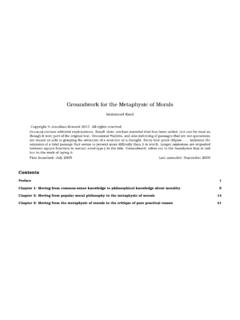

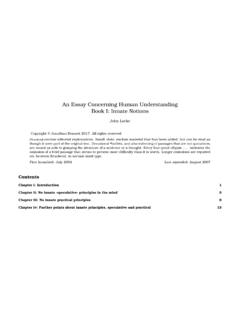


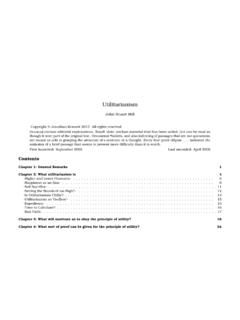

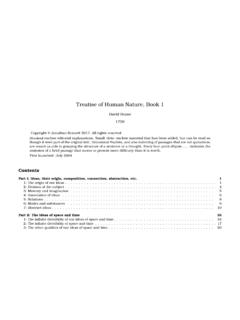
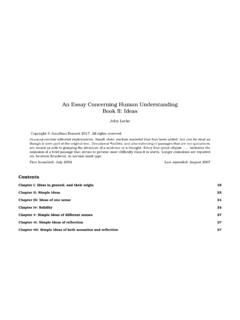
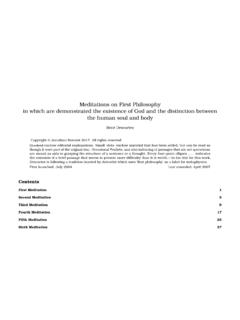

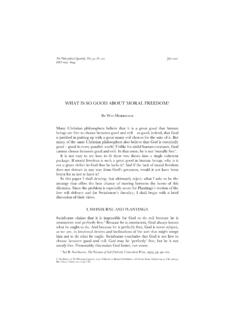
![Freedom [D, 143 bpm, 4/4] - Clover Sites](/cache/preview/7/b/3/2/e/a/0/2/thumb-7b32ea021db8eff043c12a0e79a94712.jpg)






